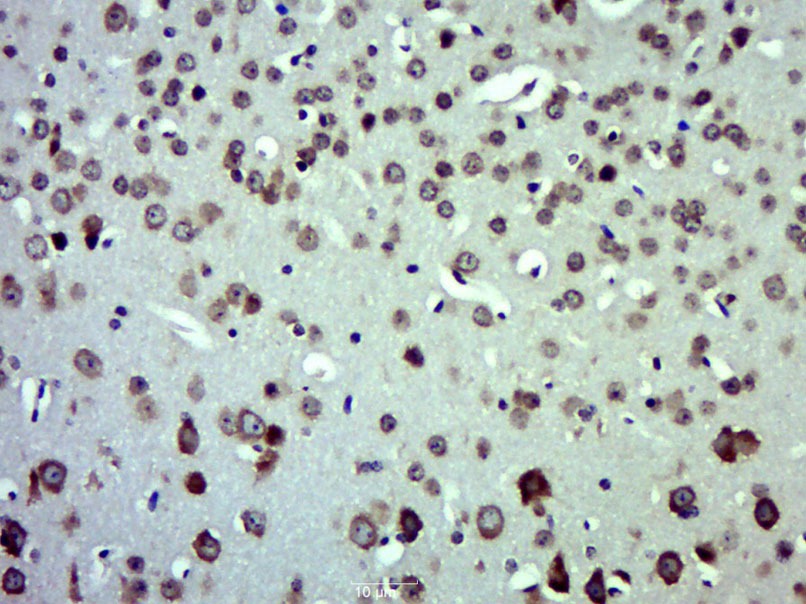Shopping Cart
Remove All Your shopping cart is currently empty
Your shopping cart is currently empty
Anti-CXCL11 Polyclonal Antibody is a Rabbit antibody targeting CXCL11. Anti-CXCL11 Polyclonal Antibody can be used in IF,IHC-Fr,IHC-P.
| Pack Size | Price | USA Warehouse | Global Warehouse | Quantity |
|---|---|---|---|---|
| 50 μL | $221 | 7-10 days | 7-10 days | |
| 100 μL | $374 | 7-10 days | 7-10 days | |
| 200 μL | $529 | 7-10 days | 7-10 days |
| Description | Anti-CXCL11 Polyclonal Antibody is a Rabbit antibody targeting CXCL11. Anti-CXCL11 Polyclonal Antibody can be used in IF,IHC-Fr,IHC-P. |
| Synonyms | SCYB9B, SCYB11, I-TAC, IP-9, IP9, H174, chemokine (C-X-C motif) ligand 11, b-R1 |
| Ig Type | IgG |
| Reactivity | Mouse (predicted:Rat) |
| Verified Activity | Paraformaldehyde-fixed, paraffin embedded (Mouse brain); Antigen retrieval by boiling in sodium citrate buffer (pH6.0) for 15 min; Block endogenous peroxidase by 3% hydrogen peroxide for 20 min; Blocking buffer (normal goat serum) at 37°C for 30 min; Antibody incubation with (CXCL11) Polyclonal Antibody, Unconjugated (TMAB-00497) at 1:400 overnight at 4°C, followed by operating according to SP Kit (Rabbit) instructionsand DAB staining.  |
| Application | |
| Recommended Dose | IHC-P: 1:100-500; IHC-Fr: 1:100-500; IF: 1:100-500 |
| Antibody Type | Polyclonal |
| Host Species | Rabbit |
| Subcellular Localization | Secreted. |
| Construction | Polyclonal Antibody |
| Purification | Protein A purified |
| Appearance | Liquid |
| Formulation | 0.01M TBS (pH7.4) with 1% BSA, 0.02% Proclin300 and 50% Glycerol. |
| Concentration | 1 mg/mL |
| Research Background | Chemokines are a group of small (approximately 8 to 14 kD), mostly basic, structurally related molecules that regulate cell trafficking of various types of leukocytes through interactions with a subset of 7-transmembrane, G protein-coupled receptors. Chemokines also play fundamental roles in the development, homeostasis, and function of the immune system, and they have effects on cells of the central nervous system as well as on endothelial cells involved in angiogenesis or angiostasis. Chemokines are divided into 2 major subfamilies, CXC and CC. This gene is a CXC member of the chemokine superfamily. Its encoded protein induces a chemotactic response in activated T-cells and is the dominant ligand for CXC receptor-3. The gene encoding this protein contains 4 exons and at least three polyadenylation signals which might reflect cell-specific regulation of expression. IFN-gamma is a potent inducer of transcription of this gene. [provided by RefSeq]. |
| Immunogen | KLH conjugated synthetic peptide: mouse CXCL11 |
| Antigen Species | Mouse |
| Gene Name | CXCL11 |
| Gene ID | |
| Protein Name | C-X-C motif chemokine 11 |
| Uniprot ID | |
| Biology Area | Autoimmune,Alpha Chemokines (CXC),Neurodegenerative disease |
| Function | Chemotactic for interleukin-activated T-cells but not unstimulated T-cells, neutrophils or monocytes. Induces calcium release in activated T-cells. Binds to CXCR3. May play an important role in CNS diseases which involve T-cell recruitment. May play a role in skin immune responses (By similarity). |
| Molecular Weight | Theoretical: 9 kDa. |
| Stability & Storage | Store at -20°C or -80°C for 12 months. Avoid repeated freeze-thaw cycles. |
| Transport | Shipping with blue ice. |
| Size | Quantity | Unit Price | Amount | Operation |
|---|

Copyright © 2015-2026 TargetMol Chemicals Inc. All Rights Reserved.